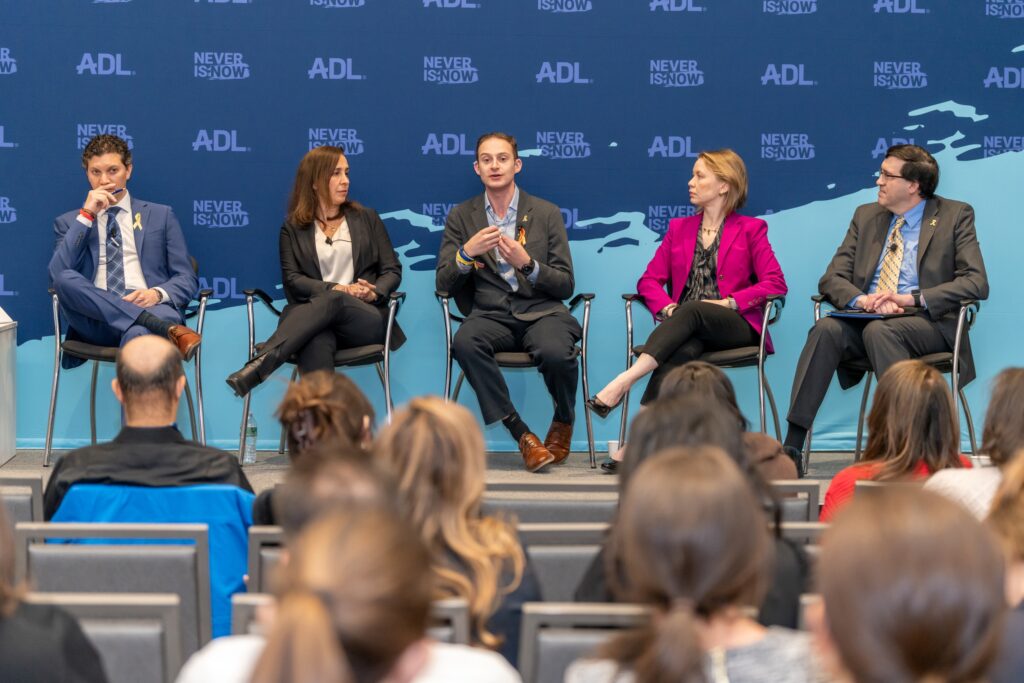At a time when fostering inclusion and belonging in the workplace is more important than ever, Jewish Employee Resource Groups (ERGs) play a critical role in supporting Jewish employees. No one understands this better than Steven Phillips, the founder of JewishERGs. Steven has dedicated himself to helping professionals establish and grow Jewish ERGs within their companies, providing them with the tools, resources, and connections needed to thrive. We were thrilled to welcome Steven on a panel on Countering Antisemitism and Anti-Zionism at Work at ADL’s Never Is Now, the world’s largest summit on antisemitism and hate. His insights on the value of Jewish ERGs and their role in building more inclusive workplaces will be invaluable. In this guest post, Steven shares his journey, the challenges Jewish ERGs face, and why their presence is essential in today’s corporate world.
By Steven Phillips
My late grandfather always joked that there were only three things guaranteed in life:
- You’re born,
- You die,
- You’ll pay taxes.
While he’s not wrong, it’s unfortunate that I believe there is a 4th guarantee:
Jews will experience antisemitism in almost any setting… including the workplace.
Antisemitism in the Workplace
Antisemitism in the workplace is nothing new – from Jews being excluded from Working Guilds in the Middle Ages, to quotas on Jews in law and medicine at institutions like Harvard and Yale in the middle of the last century – just like antisemitism generally, workplace antisemitism finds a way to mutate through time to manifest in another, newer form.
Given such a well-documented and researched history, you might hope that Jews were placed ‘front and center’ of work that has been long ongoing to improve the sense of employee belonging and to ensure that staff feel comfortable to bring their “full self to work.” Yet, a recent study[1] which surveyed the JewishERGs network and other Jews in the workplace found that 56% of respondents do not feel supported by their employer to express their Jewish identity at work.
This statistic, which may sound alarmingly high, was not surprising to me as co-founder of JewishERGs – the world’s largest network of Jewish Employee Resource Group (ERG) leaders.
Since 2019 I have been actively engaged in creating spaces for Jews to not only feel comfortable at work, but to educate their colleagues about being Jewish, while most importantly, enjoying being Jewish at work. Personal experience, research and a plethora of stories from our now thriving network of members means that I am sadly unsurprised that many Jews don’t feel comfortable bringing their “full self” to work.
Anti-Zionism in the Workplace
The ADL reported that between 7th October 2023 and 10th June 2024 there were over 10,000 antisemitic incidents reported in the US[2] – so it comes of no surprise that antisemitism is alive and well in the workplace today, even in organizations with robust programs to reduce racism and prejudice and educate employees. One of the reasons for this is that these programs often fail to include Jews in their anti-hate education. This leaves the world’s oldest hatred unchecked and free to grow and mutate as it always does into various forms, including anti-Zionism.
Before October 7th, many Jews found the workplace to be a place to go where they weren’t bombarded with the antisemitism they saw elsewhere, such as on social media. Since October 7th, however, this is no longer the case, as anti-Zionism has been allowed to become normalized. Coupled with a lack of understanding – by those who are trusted to investigate and stop workplace hate – of why anti-Zionist rhetoric can be antisemitic, the workplace has become a hostile environment for many Jews who identify as Zionists.
Antisemitism of the Unknowing
While there is no mistaking that traditional forms of antisemitism are alive and well in the workplace, I believe the greater risk is a new form of antisemitism, borne from a lack of knowledge.
This ‘Antisemitism of the Unknowing,’ often presents itself alongside more traditional antisemitism creating the perfect storm for Jew hatred to take hold:
If a company was to schedule its annual whole company conference on Christmas day, employees would be up in arms, yet through lack of knowledge, I regularly hear stories of such events being scheduled on Yom Kippur.
While not expressly antisemitic, this is exclusionary, and the lack of understanding of the importance of a day such as Yom Kippur is certainly something I would consider as an example of ‘Antisemitism of the Unknowing.’
To further this, employees then find themselves in a position to explain that while they are not religious, perhaps even agnostic or atheist, they still will not work on Yom Kippur. This plays into another great example of the ‘Antisemitism of the Unknowing:’ “Jews are just a religion.”
Is this stance expressly antisemitic? No, but does this stance erase our culture, ethnic and spiritual identity as a Jewish people? You bet – this stance is a perceived belief by non-Jews who are often trying to fit a ‘Magen David shaped peg’ into a square hole.
Jewish ERGs are Crucial to Address Workplace Challenges and Bridge the Knowledge Gap
So, how do we counter this and to begin to close that knowledge gap? Just as we do for our Black colleagues or Asian colleagues or our LGBTQ+ colleagues, we should create spaces for employees to feel safe, within a common bond. They should feel safe enough not just to bring their full identity to work, but to do so in a way that helps educate their teams and colleagues on what being Jewish means to them – from the Jew that prays 3 times a day, to the Jew whose Jewish identity revolves around bagels and schmear.
This space and its leaders provide an interface for the company to learn what it means to be Jewish, to be the “consultant” to the company on how to ensure their Jewish employees feel they are included while also being able to be the voice of the company’s Jewish customers – driving business value too!
The importance of having an ERG or Jewish network to be an interface with your Jews is often understated. The last 16 months has shifted the dynamic for every Jew in the world; antisemitism masked as anti-Zionism is now louder and prouder than ever including in the workplace. Yet companies are often not acting on reports due to lack of understanding of why employees sharing “From the River to the Sea,” would make Jewish colleagues feel uncomfortable.
To counter this rising tide of antisemitism, we need to invest not just in ‘classic antisemitism training’ but also a wide range of Jewish cultural awareness training – an explanation of what it means to be a Jew in the workplace in 2025.
Amplifying, supporting and championing Jews within the workplace is a key component to this ‘cultural awareness awakening,’ and providing Jews a place to feel safe with an ERG is simply the start, the most basic thing you can do, to begin to remove Jewish hatred from the world.
I hope one day, I will be able to sit back and reflect on my late grandfather’s outlook on life, and for it to be entirely true… while I know for now my suggestion of a fourth criteria is very much prevalent, I hope by providing and supporting Jews with a safe space at work, we’ll be able to move the dial enough that our only constant worry is a tax return.
About Steven Phillips
Born and raised in London, Steven built a career in technology, solving large scale IT and Cyber Security challenges. While at Amazon, he founded their Jewish Employee Group, igniting his passion for building Jewish communities and educating others about Jewish identity.
Steven co-founded JewishERGs, now the world’s largest network of Jewish Employee Resource Group (ERG) leaders in response to the roadblocks he faced creating his Jewish Employee group. The organization helps establish and grow Jewish ERGs and leaders globally – helping make the workplace better for Jewish Employees.
In 2024, Steven left his technology career behind him to focus full-time as Executive Director of JewishERGs. Since then, he has created and led two trips to Israel, worked on ground breaking research into Jewish workplace experiences, and continues to build and run a thriving global community of Jewish leaders in over 190 workplaces.
[1] Jewish at Work 2024 Study – Clal – www.JewishAtWork.com
[2] – ADL – https://www.adl.org/resources/press-release/over-10000-antisemitic-incidents-recorded-us-oct-7-2023-according-adl
This information is for educational purposes only and should not be interpreted as investment advice or an investment offering. Investors should consult with an advisor to determine the suitability of any investment option or strategy. JLens disclaims responsibility or liability for any advice given to third parties or decisions to invest in any investment or other vehicle by you or third parties based on the information. Any investment in funds involves a risk of losing money. Past performance is not indicative of future results.




